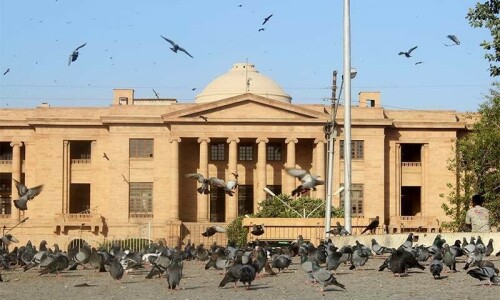Civil society organisations on Wednesday hit out at the continued disruption of social media platforms and network shutdowns across the country, demanding that the clampdown be immediately lifted.
Access to X has been disrupted in many areas of Pakistan since February 17, when former Rawalpindi commissioner Liaquat Chattha accused the chief election commissioner and chief justice of Pakistan of being involved in rigging the February 8 general elections.
Similar disruptions were also observed during the general elections.
A group of human rights activists and civil society organisations issued a statement today, and expressed “profound concern over the increasing instances” of internet shutdowns and social media platform blocking, saying that such actions not only infringed upon fundamental rights of freedom of expression and access to information but also set a “troubling precedent of throttling genuine political discourse, including plurality of voices in the country”.
“The arbitrary blocking of platforms, including the prolonged and unannounced disruption of ‘X’ (formerly known as Twitter), is a sobering illustration of growing digital censorship in the country.
“Such actions not only silence diverse political voices but also create an environment which contributes to the spread of misinformation. Today, digital platforms play a pivotal role in shaping public discourse, and ensuring the free flow of information, through these digital mediums, is imperative for an informed society and fair electoral processes.
“The suppression of digital platforms, especially when initiated without transparency, often lacks adherence to due legal process and thus, undermines Pakistan’s international law commitments,” the statement reads.
It also criticised the Pakistan Telecommunication Authority (PTA) for its inaction over the matter, saying the authority’s complete silence was “extremely alarming” as it had “failed to furnish any reasons for its actions and exceeded its mandate to block an entire internet platform”.
The statement said the absence of transparency in the decision-making processes surrounding network shutdowns and platform blocking, and the “complete disregard for any accountability” had resulted in an “obvious erosion of trust between the state and its citizens”.
“We are also dismayed by reports of throttling of VPNs (virtual private networks), undermining people’s access to information and right to privacy.”
The civil society collective called on the government to take immediate action to “reverse the course of digital censorship” in the country such as the following steps:
- Immediately unblock X in Pakistan.
- Repeal sections of the law, such as Section 37 of Prevention of Electronic Crimes Act, that enable censorship and violate Article 19 (right to freedom of speech and press freedom) and Article 19-A (right of access to information).
- Act with transparency on decisions that impact the free use of the internet, including for political and economic purposes.
- Issue statement of clarification, outlining the reasons and legal basis for the recent blocking of X and other affected platforms.
- Avoid future actions that obstruct the free flow of information and adversely affect political discourse within the country, and take back all legislative proposals expanding control and censorship over the internet, including that the e-safety bill from the previous government’s tenure should not be revived.
- Abide by Pakistan’s commitments to uphold freedom of expression and right to access to information under the International Covenant on Civil and Political Rights and the Universal Declaration of Human Rights.
“We urge the incoming government, regulators and other public bodies to recognise that any action that affects the flow of information and limits citizen’s ability to express themselves, has a direct and lingering impact on citizen’s human rights, including the right to political participation,” the statement concluded.
Signatories to the statement included digital campaigning group Bolo Bhi, Media Matters for Democracy, Human Rights Watch, Human Rights Commission of Pakistan, Aurat March Lahore, Pakistan Digital Editors Alliance and several activists and journalists.
More recently, the high courts have also put the PTA on notice regarding the restricted access to social media platforms.
‘Categorically’ against censorship, need to protect state as well: information minister
Meanwhile, Information Minister Ataullah Tarar said he was “categorically” accepting that he was against censorship. However, he pointed out that the government also needed to protect the state.
“I am against censorship,” Tarar said in an interview on Geo News programme Capital Talk.
He said that people abroad were trying to spread anarchy in Pakistan.
“Their daily efforts are to not let the stock exchange grow [and] to scare the foreign investors that Pakistan is defaulting,” Tarar said, adding that Pakistan had to move beyond these issues.
He said that the issue regarding censorship would be discussed on the government level which would try and achieve a balance that did not compromise freedom of expression while also protecting the state’s interests.
“We have to achieve the middle ground,” Tarar said.





























